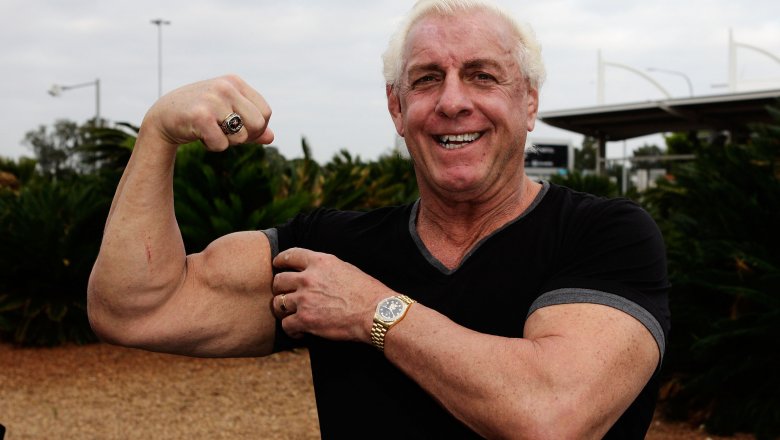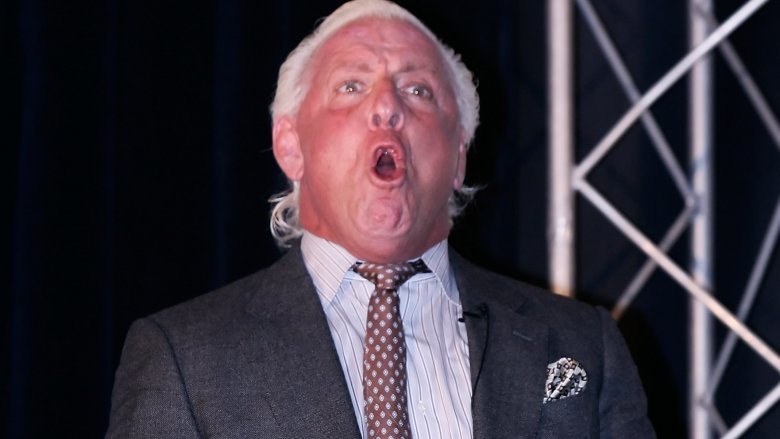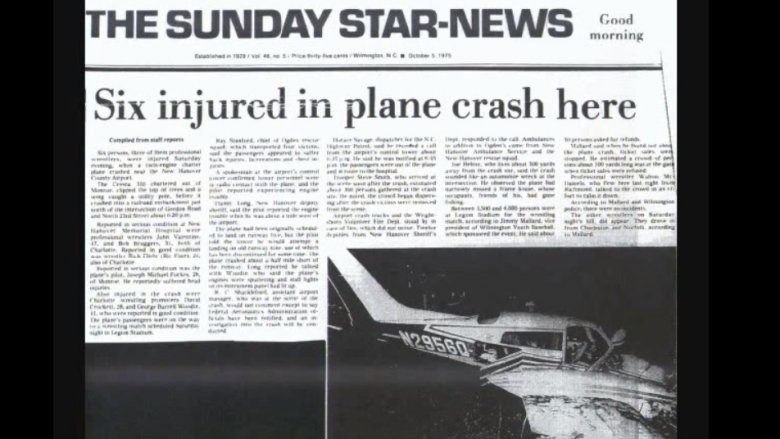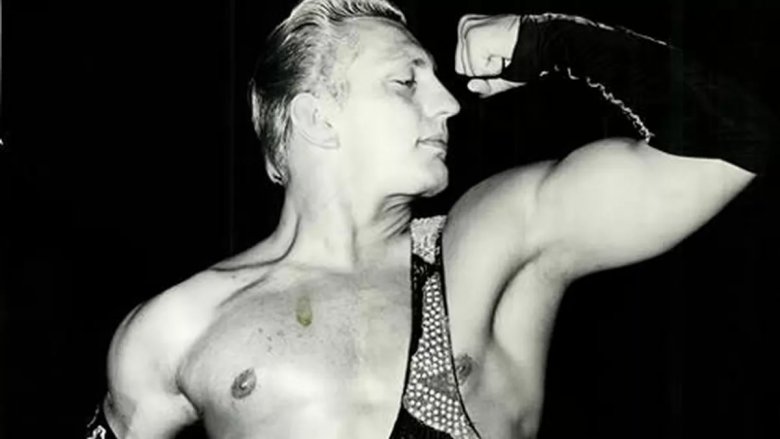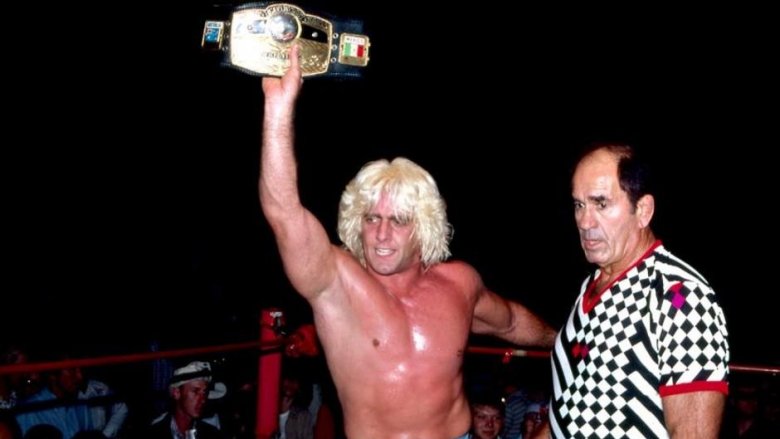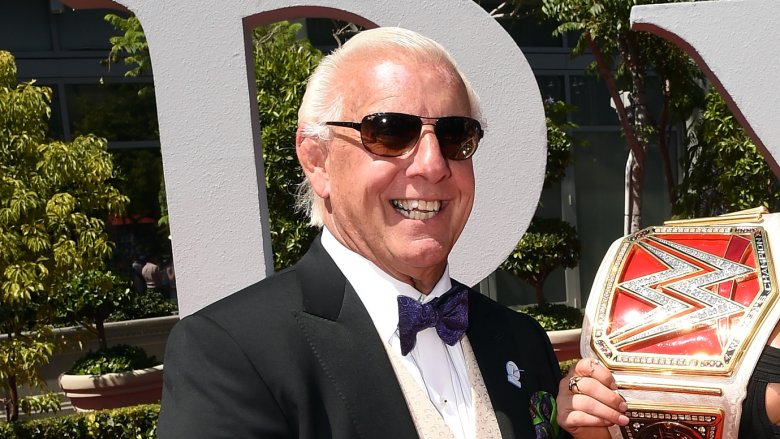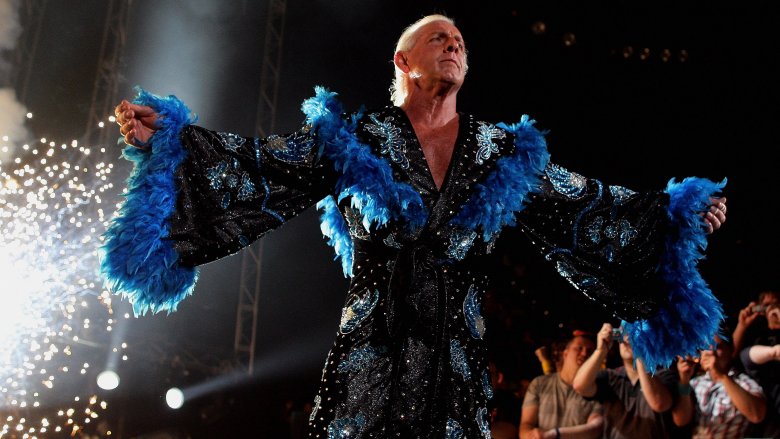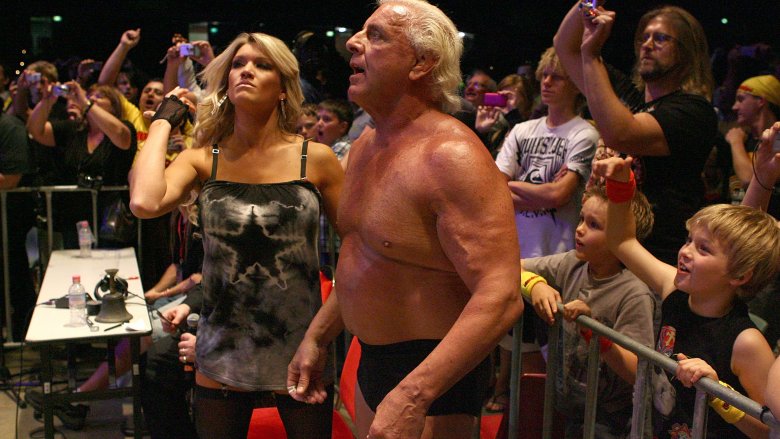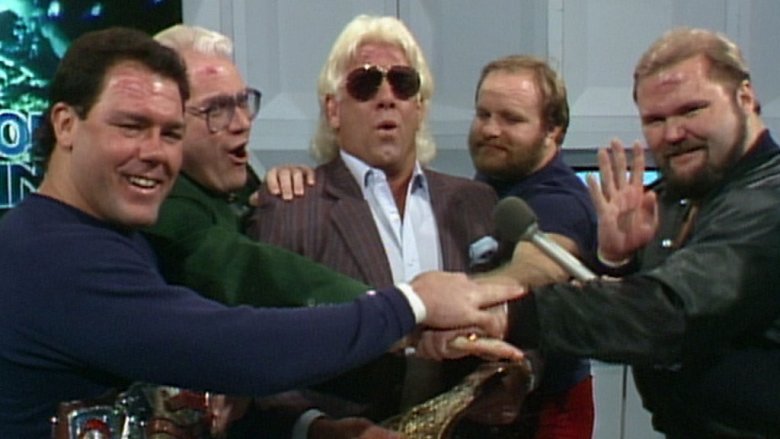The Untold Truth Of Ric Flair
Wrestling fans and non-fans alike know the legendary Ric Flair as a 16-time world wrestling champion, a guy who rides limousines, flies Lear jets, steals kisses, wheels and deals, and is overall quite the son-of-a-gun. But there's a lot more to the guy than figure-four leglocks, expensive robes, and WHOOing all the live-long day. After all, you don't craft a 40-year pro wrestling career by being boring.
He came from a shady orphanage
Many fans know Ric Flair's real name is Richard Fliehr — same name, but way cooler. But do you know his real real name? Probably not, because even Flair himself isn't sure.
Ric Flair, as he explained in his autobiography, To Be The Man, was born February 25, 1949, and his name was Fred. His last name was either Phillips, Stewart, or Demaree, but he has no idea because he never met his parents. When he was just a couple weeks old, his parents reportedly abandoned him at an orphanage called the Tennessee Home Children's Society. We say "reportedly" because THCS was a super-shady operation, one that (as recounted by the LA Times) was known to steal children from poor parents — often through deceitful documentation made legal through the Society's cushy relationship with Tennessee judge Camille Kelly — and then charge exorbitant amounts to families looking to adopt. "Fred" was one such child, and he was sent off to live with the Fliehr family a week or so after arriving at the THCS. They renamed him Rick and started him on the path to Nature Boydom.
If nothing else, it makes total sense that Flair, one of the best rule-breakers in wrestling history, got his start at an orphanage that did nothing but break the rules.
He nearly died in a 1975 plane crash
Flair started wrestling in December 1972 and stopped just a few years ago. Amazingly, the man's career came really close to ending almost as soon as it began.
As Canoe recounted, on October 4, 1975, Flair and several other wrestlers were flying to a show in a small Cessna plane. Apparently, the pilot dumped fuel because the plane was too heavy, what with all the bulky wrestlers chilling inside, and the old bird ran out of gas and crashed just before reaching its destination. The pilot died, a wrestler named Johnny Valentine was paralyzed for life and had to retire, and Flair broke his back in three separate areas. Amazingly, that was the preferable fate, as he was apparently originally supposed to sit in Valentine's seat. Had he, he would likely have been gone decades ago.
As it stood, Flair's back was broken, and doctors told him he would never wrestle again. They also said his recovery time would be at least a year. Flair, being a stubborn old man even in his 20s, refused to accept that. He started hardcore rehabilitation and was back in the ring by February 1976. From a thrice-broken back to the ring in four months — no wonder Death failed to take Ric Flair after bowel surgery. He's not the Nature Boy; he's the Nature Highlander.
He wasn't the first Nature Boy
Ric Flair calls himself the Nature Boy (which doesn't make any sense, since his high-rolling ladies' man gimmick has precisely nothing to do with the environment), but that wasn't his idea. In fact, he basically stole it from another wrestler: the original Nature Boy, Buddy Rogers.
He didn't just use Rogers' nickname, either — like Flair, Rogers was a flamboyant, braggadocious, arrogant ladies' man with bleach-blonde hair, a mastery of a figure-four leglock, and a habit of strutting more than he walked. This was a guy who, according to WWE.com, after winning the NWA World Championship in 1961 said of himself, "to a nicer guy, it couldn't happen." He took the name "Nature Boy" from a jazz song (even though, as with Flair, his character had less-than-squat to do with nature), and rode that character to becoming WWE Champion in 1963. He was the first WWE champion, in fact. After quickly losing it to Bruno Sammartino, Rogers mostly vanished. Years later, Ric Flair "borrowed" the gimmick wholesale, and in 1979, Rogers reappeared to challenge the young upstart. Flair ultimately won the "Battle of the Nature Boys" and is now synonymous with the name, despite it not being his thing. If Rogers was Mother Nature's boy, then Flair is like the stepchild come to steal the inheritance.
He's been World Champion way more than 16 times
A huge part of Flair's gimmick is his being World Champion an amazing 16 times. Oddly enough for a hyperbole-driven industry like pro wrestling, this number is an understatement. In truth, Flair has been World Champion anywhere from 18 to 25 times, depending which wrestling historian you ask.
According to PWInsider (which argues that Flair has been champion 21 times), there were several instances in the NWA, where Flair would lose the title in another country, quickly gain it back, and have the switch go unannounced by the NWA. These were "phantom" title changes, designed to make the local fans happy. In one case, Flair lost to Puerto Rican legend Carlos Colon in Puerto Rico, only to gain the belt back just a couple weeks later. In another, Flair lost to Dominican Republic favorite Jack Venano in the DR because he recognized the crowd was about to riot if he kept the belt. So he changed the script and lost on purpose — twice — to preserve everyone's safety. When he returned to the States, he had the belt and everyone pretended the Venano thing never happened.
As time went on, it became harder to pull off phantom title changes because there was more media reporting on everything. Still, Flair had some title reigns disputed up until his final days as champion, mostly because the storylines made so little sense that no one could tell when one reign ended and another began.
Rap songs keep name-checking him
You wouldn't think hip-hop would care about some old pro wrestler, and yet Ric Flair seemingly gets name-checked by rappers more often than actual rappers do. Hip-hop simply cannot get enough of the guy, despite him rarely, if ever, rhyming his promos.
It makes sense — Flair's character is all about money, women, fine clothes, champagne, jet-setting, and being the coolest and most awesome person in the room. Hip-hop loves all those things, so Nature Boy's a bit of a rap cult hero. Billboard compiled a list of Flair references in rap, ranging from Pusha T rapping "(Woo!) That's rare n***a / (Woo!) Ric Flair n***a / (Woo!) The power's in my hair n***a (Woo!) / I give this beat the chair n***a" to Iggy Azalea spitting, "Stuntin', Ric Flair on ya / My stock high, blow the whole share on ya." The list also features three songs literally titled "Ric Flair" because subtlety in hip-hop is rarer than good steak.
Flair even appears on the occasional track, usually as a sample. On Meek Mill's "Bout That Life," for example, Flair makes an appearance to rant, "It's so hard for me to sit back here, in this studio, looking at a guy out here hollering my name, When last year I spent more money on spilt liquor in bars from one side of this world to the other, than you made." This was taken from an old NWA promo, but applies to young rappers just as much as it did to young wrestlers.
WCW almost changed his ring name to 'Spartacus'
Ric Flair by any other name, or any other gimmick, is akin to sacrilege. So naturally, somebody tried to commit that sacrilege in WCW, and the proposed character change would be the dumbest pro wrestling idea ever if someone hadn't decided to make David Arquette a wrestling champion years later.
In the early '90s, WCW was run by Jim Herd, a former pizza company executive with no wrestling experience or knowledge. According to Flair's autobiography, Herd wanted to be like Vince McMahon, only McMahon has been in wrestling for decades and actually understands it. Herd, meanwhile took a look at Ric Flair and, despite the Nature Boy being one of WCW's top draws, decided he was "outdated" and needed to become somebody totally different to compete with the WWE. So Herd tried to turn Flair into "Spartacus," which meant Flair would cut his hair, wear an earring, carry a shield to the ring, and act exactly like somebody named "Spartacus" would act. Flair didn't take it well, sarcastically saying to Herd, "While we're doing this, why don't we go to Yankee Stadium and change Babe Ruth's number?" Don't give him ideas, Ric — he might just try it.
Obviously, Flair refused the opportunity to cosplay as a Roman gladiator. He did, however, agree to cut his hair, a decision he immediately regretted. After all, a Nature Boy without long, flowing blonde locks is hardly natural at all.
The Plane Ride from Hell
No list of wrestling's least-proud moments would be complete without mentioning the Plane Ride From Hell. In 2002, WWE finished a tour of Europe and was flying back on a WWE-chartered plane. Vince McMahon made the mistake of providing an open bar, something several wrestlers took advantage of to disastrous effect. Drunken wrestlers fought each other on the plane, sexually harassed flight attendants, took pills, and just generally acted like, as legendary announcer Jim Ross put it on his "Ross Report" blog, "children whose parents were away and left the liquor cabinet unlocked."
Ric Flair was one of the instigators. According to former WWE wrestlers X-Pac and Justin Credible, who were on the flight, a drunken Flair reportedly exposed himself to at least two flight attendants. According to Credible, with "junk flying everywhere, [Flair was] going up to the stewardesses, "C'mon sweetheart! [flashes open robe] 'WOOOOO!!!'" We're guessing this is not what Flair had in mind when he bragged about being a jet-flying son-of-a-gun.
It's not just wrestler hearsay. As reported by Grantland, two of the flight attendants sued WWE for sexual harassment, claiming Flair "flashed his nakedness, spinning his penis around" while wearing nothing but an open ring robe. Flair, of course, denies the allegations, but the women successfully negotiated a settlement from WWE, so take that as you like it.
He's terrible with money
A huge reason Flair kept wrestling well into his '60s is because he had to — Flair is drowning in debt, and mismanages his money to such a degree, the bills keep piling up.
Grantland detailed many of Flair's financial woes, dating back to 1990, when the IRS demanded he pay $62,000 in back taxes from the '80s. But it didn't get really bad until the 2000s. The IRS demanded more back taxes from the '80s, multiple banks and ex-business partners sued for loans Flair hadn't paid back, and the IRS demanded $874,000 in '90s taxes. By 2005, it was seizing his WWE pay to cover his debts. By 2009, he was $1.7 million in debt against a $400,000 WWE salary. He hurts himself worse by overspending on his lifestyle. According to Grantland, he and his fiance, Jacqueline, still spent several thousand dollars a month traveling and dining in 2011. He once purchased a $100,000 engagement ring for another ex-fiance and does things like put up a world title belt as collateral ... for two different companies at once. He calls himself "The Dirtiest Player In The Game," but "Dirtiest Non-Payer" seems more apropos.
Naturally, someone this terrible with money would try to enter the money business. In 2007, Flair launched Ric Flair Finance, devoted to securing loans for customers at competitive rates. It didn't last long; perhaps Flair kept lending himself money and wouldn't pay himself back.
The 'Four Horsemen' name came about by accident
Ric Flair's wrestling career is defined, in large part, by his association with the Four Horsemen, a stable of heel wrestlers he led in the '80s and '90s who would wreak havoc on all and often monopolized their promotions' championships. But the group's iconic, fear-evoking name came not from some scriptwriter or even from a promo master like Flair, but rather one of his fellow Horsemen. Even funnier, it came about completely by accident.
According to Mid-Atlantic Gateway, by the fall of 1985 Ric Flair, Arn and Ole Anderson, and Tully Blanchard had joined forces to terrorize the NWA. During a random, non-televised interview, Arn Anderson, one of the toughest talkers in wrestling history, bragged of his group's successes, "Not since the four horsemen of the apocalypse have so few wreaked so much havoc on so many." He said this completely off the top of his head and apparently thought very little of it at the time. But then, according to Anderson himself, announcer Tony Schiavone "looked at me after the promo was over and said, 'I think you just named yourself.' And that led to us starting to refer to ourselves as the Four Horsemen."
Clearly, the name stuck, and being a Horseman has become part of Flair's identity.
He used to be a huge, bruising, badass brawler
Ric Flair, despite always having an impressive build and still sporting bulging biceps well into his 60s, rarely gets credit as a "big man." But when he started his career, he was unmistakably that — a huge, hulking power wrestler, weighing about 280 pounds (according to Les Thatcher, an opponent of his at the time) and absolutely looking the part.
Early pics of the future Nature Boy show him as a bruiser, with short brown hair, a stocky build, and far more of a smash-mouth style than what he's famous for. Swole Flair was more interested in lifting weights and busting heads than in stealing kisses and riding limousines. He slimmed down noticeably after his 1975 plane crash, and the broken back made it impossible for him to brawl the way he used to. So, as explained by CBS Sports, he changed his style, becoming more of a technical wrestler, seasoned with heavy amounts of rule-breaking. With a new style and a name like Flair, he transformed himself into the legendary wrestler the '80s, '90s, '00s, and '10s couldn't possibly imagine themselves without.
